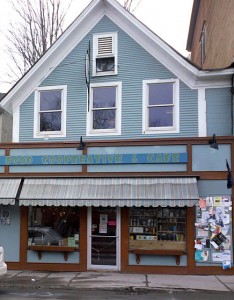By Kaitlyn Elias
Kaitlyn Elias is a seasonal staff member for the Farmer Training Program at the University of Vermont. In this post, she shares about a tomato tasting at UVM last month.
 heirloom noun \ˈer-ˌlüm\: a horticultural variety that has survived several generations usually due to the efforts of individuals
heirloom noun \ˈer-ˌlüm\: a horticultural variety that has survived several generations usually due to the efforts of individuals
It’s a gorgeous August afternoon, just after 12:00 p.m. Outside of the Bailey Howe Library at UVM sits a white linen-covered table with ice cold beverages, cutting boards, paring knives, plates, and a rainbow of asymmetric tomatoes. Continue reading













